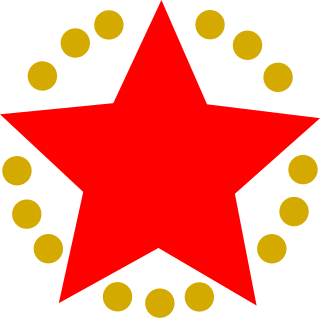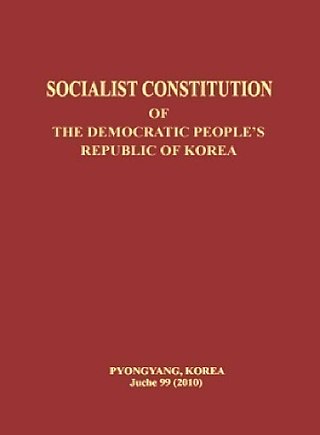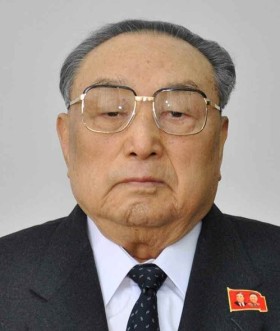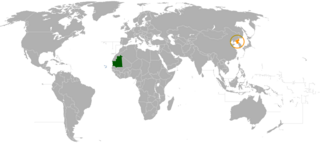President of North Korea was the title of North Korea's head of state from 1972 to 1994, officially translated as "President of the Democratic People's Republic of Korea". It can also refer to:

Kim Yong-nam is a North Korean retired politician who served as the President of the Presidium of the Supreme People's Assembly of North Korea, from 1998 until 2019. Previously, he served as Minister of Foreign Affairs from 1983 to 1998. He was elected a member of the Presidium of the Workers' Party of Korea (WPK) in 2010.
Kim or KIM may refer to:

The Supreme People's Assembly is the legislature of North Korea. It is ostensibly the highest organ of state power and the only branch of government in North Korea, with all state organs subservient to it under the principle of unified power. However, in practice it is widely considered to be a rubber stamp legislature which exists to approve decisions made by the ruling party as a formality, and which has little to no real power of its own.
Wonsu is the highest military rank in the armed forces of North Korea and South Korea.

The premier of the Cabinet of the Democratic People's Republic of Korea, commonly called the premier of North Korea, is the head of government of North Korea and leader of the Cabinet.

The United States Army Military Government in Korea (USAMGIK) was the official ruling body of the Southern half of the Korean Peninsula from 8 September 1945 to 15 August 1948.

The Socialist Constitution of the Democratic People's Republic of Korea is the constitution of North Korea. It was approved by the 6th Supreme People's Assembly at its first session on 27 December 1972, and has been amended and supplemented in 1998, 2009, 2012, 2013, 2016, 2019 (twice), and in 2023. It replaced the country's first constitution which was approved in 1948.

The eternal leaders of North Korea are mentions of deceased leaders of North Korea. The phrase was mentioned in a line of the preamble to the Constitution, as amended on 30 June 2016, and in subsequent revisions.
A supreme leader or supreme ruler typically refers to the person among a number of leaders of a state, organization or other such group who has been given or is able to exercise the most – or complete – authority over it. In a religion, this role is usually satisfied by a person deemed to be the representative or manifestation of a deity or God on Earth. In politics, a supreme leader usually rules over an authoritarian or totalitarian government and has a cult of personality associated with them. Historic examples are Adolf Hitler of Nazi Germany, Francisco Franco of Francoist Spain, Benito Mussolini of Fascist Italy and Joseph Stalin of the Soviet Union.

The President of the State Affairs Commission of the Democratic People's Republic of Korea, alternatively styled "President of State Affairs" in official translations, is the supreme leader and head of state of North Korea. The president chairs the State Affairs Commission (SAC), which is the highest leadership institution in North Korea, and serves as the commander-in-chief of the North Korean armed forces.

The National Defence Commission of the Democratic People's Republic of Korea (NDC) was the highest state institution for military and national defence leadership in North Korea, which also served as the highest governing institution of the country from 1998 until 2016 when it was replaced by the State Affairs Commission.

Yang Hyong-sop was a North Korean politician who served as Chairman of the Standing Committee of the Supreme People's Assembly and Chairman of the Supreme People's Assembly from 1983 to 1998. He subsequently served as Vice President of the Presidium of the SPA from 1998 to 2019.

Kim Yong Ju was a North Korean politician and the younger brother of Kim Il Sung, who ruled North Korea from 1948 to 1994. Under his brother's rule, Kim Yong Ju held key posts including Politburo member in the Workers' Party of Korea (WPK) during the 1960s and early 1970s, but he fell out of favour in 1974 following a power struggle with Kim Jong Il. From 1998 until his death in 2021, he held the ceremonial position of Honorary Vice President of the Presidium of the Supreme People's Assembly (SPA), North Korea's parliament.

Mauritania–North Korea relations refers to the current and historical relationship between the Islamic Republic of Mauritania and the Democratic People's Republic of Korea (DPRK), commonly known as North Korea. Neither country maintains an embassy in their respective capitals.

The chairman of the Standing Committee of the Supreme People's Assembly, formerly known as the president of the Presidium of the Supreme People's Assembly, is the presiding officer of the Standing Committee of the Supreme People's Assembly, which is the permanent body of the Supreme People's Assembly, North Korea's highest organ of state power.

The State Affairs Commission of the Democratic People's Republic of Korea (SAC) is constitutionally the supreme political authority of North Korea. The State Affairs Commission was created by 2016 amendments to the North Korean Constitution to replace the previously military-dominated National Defence Commission.

The Kim–Xi meetings were a series of summits between North Korea and China during 2018 and 2019. North Korean supreme leader Kim Jong Un secretly met with Chinese paramount leader Xi Jinping on March 25–28, 2018. Xi made a classified invitation to Kim to visit China, after which Kim visited Beijing and used his bullet proof train to travel to the three-day meeting. It is his first known out-of-country diplomatic trip since taking power. Kim and Xi had a second surprise meeting on May 7–8, 2018 in the city of Dalian. Kim and Xi had a third surprise meeting on June 19–20, 2018. They had a fourth surprise meeting on January 7–10, 2019 in Beijing, followed by a fifth official DPRK and China summit June 20–21, 2019 in the Forbidden City, Pyongyang.

The president of the Democratic People's Republic of Korea was the head of state of North Korea from 1972 to 1998. The position was only occupied by Kim Il Sung from 1972 until his death in 1994. Aside from being president, Kim was also the General Secretary of the Workers' Party of Korea, Chairman of the National Defence Commission and Supreme Commander of the Korean People's Army.